- Home
- Anne Lamott
Almost Everything
Almost Everything Read online
ALSO BY ANNE LAMOTT
NONFICTION
Operating Instructions: A Journal of My Son’s First Year
Bird by Bird: Some Instructions on Writing and Life
Traveling Mercies: Some Thoughts on Faith
Plan B: Further Thoughts on Faith
Grace (Eventually): Thoughts on Faith
Some Assembly Required: A Journal of My Son’s First Son (with Sam Lamott)
Help, Thanks, Wow: The Three Essential Prayers
Stitches: A Handbook on Meaning, Hope and Repair
Small Victories: Spotting Improbable Moments of Grace
Hallelujah Anyway: Rediscovering Mercy
FICTION
Hard Laughter
Rosie
Joe Jones
All New People
Crooked Little Heart
Blue Shoe
Imperfect Birds
RIVERHEAD BOOKS
An imprint of Penguin Random House LLC
375 Hudson Street
New York, New York 10014
Copyright © 2018 by Anne Lamott
Penguin supports copyright. Copyright fuels creativity, encourages diverse voices, promotes free speech, and creates a vibrant culture. Thank you for buying an authorized edition of this book and for complying with copyright laws by not reproducing, scanning, or distributing any part of it in any form without permission. You are supporting writers and allowing Penguin to continue to publish books for every reader.
The author gratefully acknowledges permission to quote Lucille Clifton, “blessing the boats,” from The Collected Poems of Lucille Clifton. Copyright © 1991 by Lucille Clifton. Reprinted with the permission of The Permissions Company, Inc., on behalf of BOA Editions Ltd., www.boaeditions.org.
Library of Congress Cataloging-in-Publication Data
Names: Lamott, Anne, author.
Title: Almost everything : notes on hope / Anne Lamott.
Description: New York : Riverhead Books, 2018.
Identifiers: LCCN 2018013899 | ISBN 9780525537441 (hardcover) | ISBN 9780525537571 (ebook)
Subjects: LCSH: Spirituality. | Hope—Religious aspects. | Life—Religious aspects.
Classification: LCC BL624 .L35195 2018 | DDC 170/.44—dc23
LC record available at https://lccn.loc.gov/2018013899
p. cm.
Penguin is committed to publishing works of quality and integrity. In that spirit, we are proud to offer this book to our readers; however, the story, the experiences, and the words are the author’s alone.
Version_1
For Neal Allen
CONTENTS
Also by Anne Lamott
Title Page
Copyright
Dedication
Epigraph
Prelude
ONE
Puzzles
TWO
Inside Job
THREE
Humans 101
FOUR
Unplugged
FIVE
Don’t Let Them Get You to Hate Them
SIX
Writing
SEVEN
Bitter Truth
EIGHT
In the Garden
NINE
Hands of Time
TEN
Jah
ELEVEN
Food
TWELVE
Famblies
CODA
Hope
Acknowledgments
About the Author
(at St. Mary’s)
may the tide
that is entering even now
the lip of our understanding
carry you out
beyond the face of fear
may you kiss
the wind then turn from it
certain that it will
love your back may you
open your eyes to water
water waving forever
and may you in your innocence
sail through this to that
Lucille Clifton, “blessing the boats”
PRELUDE
I am stockpiling antibiotics for the apocalypse, even as I await the blossoming of paperwhites on the windowsill in the kitchen. The news of late has captured the fever dream of modern life: everything exploding, burning, being shot, or crashing to the ground all around us, while growing older has provided me with a measure of perspective and equilibrium, and a lovely, long-term romance. Towns and cities, ice fields, democracy, people—all disappear, while we rejoice and thrive in the spring and the sweetness of old friendships. Families are tricky. There is so much going on that flattens us, that is huge, scary, or simply appalling. We’re doomed, stunned, exhausted, and overcaffeinated.
And yet, outside my window, yellow roses bloom, and little kids horse around, making a joyous racket.
In general, it doesn’t feel like the light is making a lot of progress. It feels like death by annoyance. At the same time, the truth is that we are beloved, even in our current condition, by someone; we have loved and been loved. We have also known the abyss of love lost to death or rejection, and that it somehow leads to new life. We have been redeemed and saved by love, even as a few times we have been nearly destroyed, and worse, seen our children nearly destroyed. We are who we love, we are one, and we are autonomous.
Love has bridged the high-rises of despair we were about to fall between. Love has been a penlight in the blackest, bleakest nights. Love has been a wild animal, a poultice, a dinghy, a coat. Love is why we have hope.
So why have some of us felt like jumping off tall buildings ever since we can remember, even those of us who do not struggle with clinical depression? Why have we repeatedly imagined turning the wheels of our cars into oncoming trucks?
We just do.
To me, this is very natural. It is hard here.
There is the absolute hopelessness we face that everyone we love will die, even our newborn granddaughter, even as we trust and know that love will give rise to growth, miracles, and resurrection. Love and goodness and the world’s beauty and humanity are the reasons we have hope. Yet no matter how much we recycle, believe in our Priuses, and abide by our local laws, we see that our beauty is being destroyed, crushed by greed and cruel stupidity. And we also see love and tender hearts carry the day. Fear, against all odds, leads to community, to bravery and right action, and these give us hope.
I wake up not knowing if our leader has bombed North Korea. And still, this past year has been just about the happiest of my life.
So yeah: it can all be a bit confusing.
On the one hand, there is the hopelessness of people living in grinding poverty in sub-Saharan Africa, and uptown Oakland. On the other, we pour our money and time into organizations that feed and mentor people, teach in Uganda and Appalachia, show up in refugee camps with water and art supplies. People like us all over the world teach girls auto repair and electrical installation, teach boys to care for babies. Witnessing this fills me to bursting with hope. I have never witnessed both more global and national brutality and such goodness in the world’s response to her own.
And then there are our families of origin. Some of us grew up in the alternative universe of unhappy marriages, where we accepted as normal desperate parental need, and bizarre sights just short of a head on a stick. I’m sure your family was just fine, and the template of love you grew up with was kindness and mutual respect, delight in each other, patience with a spouse or a child’s foibles. But other families—just a few, here and there, hardly
worth mentioning—were stressed, neglectful, fundamentalist, racist, alcoholic, schizophrenic, repressed. Brothers and sisters didn’t always survive. We became jumpy perfectionists.
T. S. Eliot wrote, “Teach us to care and not to care / Teach us to sit still.” We long for this, and yet we check our smartphones every ten minutes for news, texts, distraction.
I wish that before my wise father died, at fifty-six, he had written down everything he had learned here, all the truths he was pretty sure of. He wrote many books of knowledge but not so much truth. Along with several fatal flaws, mostly involving women, he had several excellent rules: Don’t be an asshole, and try to remember people’s names, especially those people with no power or cachet, and seek beauty through binoculars, books, records. But truth? What did he know that might have helped his children steer their boats a little straighter? Not so much. He eschewed the spiritual life, except as his human spirit was sustained by nature, jazz, books, wine. A role model isn’t a mentor. Life gave me mentors, though—poetry, pastors, the women’s movement, naturalists, and friends—who helped me come to know several truths of which I am almost sure.
Just before my sixty-first birthday, I decided to make a list for my grandson and niece, who are both exuberant and worried, as I was at their age and still am some days—in fact, right now.
My Dearest, I began: I have had a spiritual mentor named Bonnie for three decades now, who loves me and trusts God and Goodness so crazily that I sometimes think of her as Horrible Bonnie, because I cannot get her to judge me or abandon hope. For thirty years, she has answered all of my distressed or deeply annoyed phone calls by saying, “Hello, Dearest. I’m so glad it’s you!” I’ve come to believe that this is how God feels when I pray, even at my least attractive.
So, Dearest, I began: Here is everything I know about almost everything, that I think applies to almost everyone, that might help you someday.
After writing those words, I stalled. What do I know?
I do know two specific truths about me. One is that over the course of my life I have idly thought of jumping from rooftops and out of cars.
Late last night, for instance, my wonderful boyfriend was driving me home from the airport, where he had picked me up after I had flown in from officiating at the happiest wedding I’d been to in years, for a woman of thirty-five I adore. Neal was happy to pick me up because he had missed me so, although I had actually flown out only that morning. We were speeding across the Golden Gate Bridge to our funkily delicious home, where our animals awaited, and I was studying the diamond lights of San Francisco’s bay and skyline, when the thought arose within me to open the door of his car and jump.
I was glad to be alive, in San Francisco, with Neal, and the car was going fifty miles an hour.
I rolled my eyes: Oh, you again. It was my mental roommate.
Over the decades, when it hasn’t been this thought, it’s been the one where I idly whip the steering wheel of the car and plow into a tree or big rig. I suppose this makes me sound at least a little angry, and we will save this for another day.
Of several mental health diagnoses I have received over the course of my life, one I don’t actually have is depression. I have crippling anxiety, OCD, even clinical paranoia—yes, like dear old Richard Nixon—but not depression or suicidal ideation.
Well, unless you consider a lifelong obsession with jumping from high places to be “suicidal,” which I don’t particularly.
I have just always found it extremely hard to be here, on this side of eternity, because of, well, other people; and death.
The first time I felt the tremendous pushmi-pullyu of anxiety about jumping, I was six years old, and I was with my mother and brothers in San Francisco. My mom was holding baby Stevie inside the dentist’s office, standing beside my big brother as he got a cavity filled, while I was in the waiting room trying to focus on Highlights for Children in order to avoid studying the corner window. (This is back when windows opened.) We were fourteen floors up, and a magnetic force in me was trying to pull me across the carpet to the window. And I wanted to go. I had to dig in, like someone in a game of tug-of-war or a dog resisting the bathtub. That day I won, barely.
Forty years later, my psychiatrist Rick and I made a deal. Whenever I was in any kind of elevation outdoors or in a tall building with windows that opened, I was to tell whoever was with me that I was idly thinking of jumping. This would break the trance and the tension, the power of keeping it a secret, moving toward it or backing away, like a girl trying to gauge the exact right moment to step under the arch of a jump rope swung by friends.
As you might expect, this admission tended to throw off my companions, who saw it as a buzzkill.
I’ve felt like jumping—or worried that I might jump—off bridges, the Empire State Building, a balcony overlooking a Mardi Gras parade. Every time, I have dutifully told my companions, who usually want to have little talks about the preciousness and challenges of life, permanent solutions to temporary problems, blah blah.
Only three words spoken at these times have ever helped.
A Coptic minister in Cairo once invited me to Egypt to give a lecture and a sermon, first at the American University, and then at his church in Maadi, outside the city. At dusk on my second day, he drove me up Mokattam Mountain, which is really a hill about five hundred feet high, at the base of which live as many as thirty thousand garbage workers, who gather Cairo’s garbage and sort it there, ordering it into neat stacks and bundles on rooftops—plastic, cardboard, paper, metal. Farther up the hill, a church was created inside a cave, with seating for several hundred, and artists carved massive biblical figures into the rock face of the hillside. From the church there is an exhilarating view of the sprawling city, where ancient Egypt meets Islam and Coptic Christianity, with minarets, mosques, crosses, and in the distance the pointed peaks of the pyramids. The North African light is shadow and brightness, illuminating and obscuring, mesmerizing and mind-bending.
When we got to the church, the minister and I got out of his car, and before going inside, we walked to within a few yards of the cliff’s edge, above Garbage City.
It was thrilling: the wild and pungent scene way below, donkeys and men pulling carts of garbage, women and children arranging it in piles and putting it into dumpsters, music and crosses and the hope of food that great industriousness brings. Of course I thought about jumping. How could I not?
I cleared my throat and said shyly to the minister: “I have to tell you something sort of embarrassing. I promised my psychiatrist I would tell whomever I was with when I was in any high place that since childhood, whenever I’m very, very high up, I think about jumping.”
He didn’t miss a beat. Waving away my concern, he said, “Oh, who doesn’t?”
And I could see again—the lights of the city, children sorting garbage below, the slum, livelihoods, men, donkey carts.
The second thing I know about myself is that I have seen miracles, actual miracles, where people who have been given no chance of living have lived, and in some cases are living still.
I know two families quite well who have lost two out of three children. One of these families had hosted the exuberant wedding I mentioned; the other family I’m actually related to.
My cousins, with whom I grew up, had an aunt Janet, with whom we were all in love. She was the sister of my very beloved uncle Millard, the tall, skinny man my mother’s twin sister married, so she wasn’t “our” aunt, but in the truer sense, Janet was ours because she was always around and she loved my family so. We saw her at every holiday. She was hilarious, very thin, beautiful in a tomboy way, joyously married to a shy and loyal engineer, and was the mother of three. She always joined in with the drinking and repartee.
Then one of her sons died suddenly when he was twelve, of an aneurysm. It was the end of the world. The whole family was crushed. Janet must have been as flattened as a
tender green shoot. How can one possibly come through something so horrible? Parents are blown over by something this catastrophic—how can they not be?—and their roots barely stay in the shifting soil. But life holds on. Little by little, nature pulls us back, back to growing. This is life. We are life.
And we’re rarely all alone. People come and go in our lives, surround us with their best selves, take us to the beach, to a bookstore, out for ice cream. So little bits of life and grace, time, habits, duties, a phone call, more time, all filter in to the seed under the concrete. And that seed pushes up through, no matter what, because this is how life is constructed—to live.
Many years after her son died, Janet was diagnosed with inflammatory breast cancer, and given a year at most to live.
She did all the chemo and radiation she could take, and then all the alternative modalities, too: supplements, deep meditation and affirmations. She went to New Age healing clinics, where the basic teaching was that love is the only truth, and that truth heals. She and I almost alone in our big family shared a belief that we were spiritual beings having human experiences, not vice versa, and that spirit, love, and truth were actual reality, superseding the vagaries of our physical realities. Everyone else teased us, calling us the woo-woo twins.
Then she started to get better. Months passed and her strength and color returned, and the cancer receded, visibly. She and her quiet husband, Ray, started to go line dancing again, every week.
She missed a holiday after her diagnosis, and then the next Christmas she showed up at my uncle Millard’s house. We were all gobbling down dip, gravlax, and bourbon, enjoying the banter, insults, one-upmanship, and erudite highbrow humor that defined our family. She grew quiet.
Then she asked for our collective attention. She said that things had changed for her now that she was fighting for her life. Her healing was dependent on loving environments and feedback, on continually giving and receiving love and positivity, and avoiding stress as much as possible. Therefore, she needed us to make a decision as a family whether we wanted to keep up our hilarious but hostile ribbing, and self-doubt disguised as humor, which she had always loved and enjoyed and participated in, or whether we wanted her to join us for our family gatherings, in which case we needed to change to a better station, with more love, listening, and gentler humor.

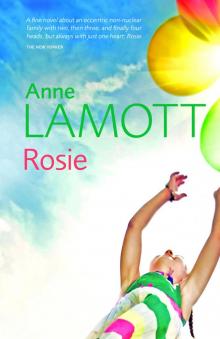 Rosie
Rosie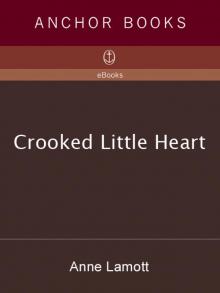 Crooked Little Heart
Crooked Little Heart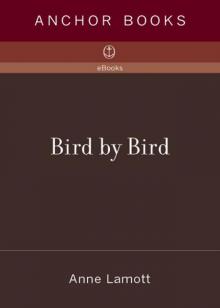 Bird by Bird: Some Instructions on Writing and Life
Bird by Bird: Some Instructions on Writing and Life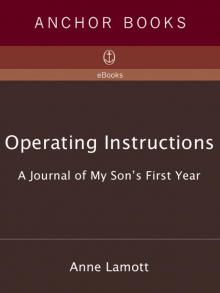 Operating Instructions: A Journal of My Son's First Year
Operating Instructions: A Journal of My Son's First Year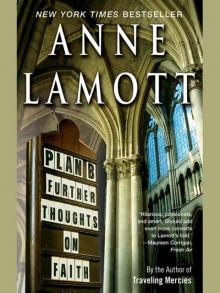 Plan B: Further Thoughts on Faith
Plan B: Further Thoughts on Faith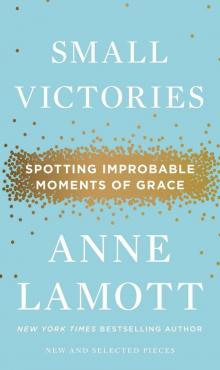 Small Victories: Spotting Improbable Moments of Grace
Small Victories: Spotting Improbable Moments of Grace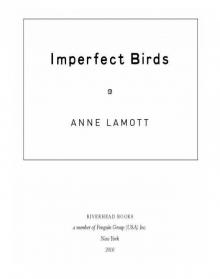 Imperfect Birds
Imperfect Birds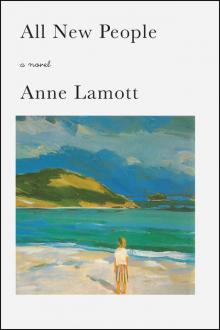 All New People
All New People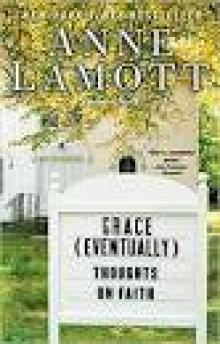 Grace (Eventually)
Grace (Eventually)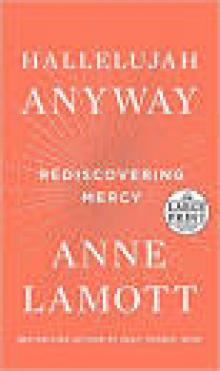 Hallelujah Anyway
Hallelujah Anyway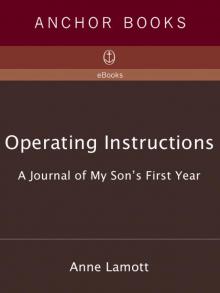 Operating Instructions
Operating Instructions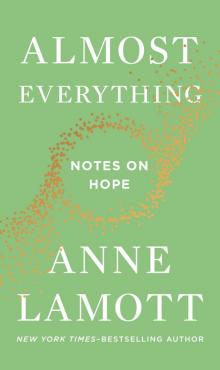 Almost Everything
Almost Everything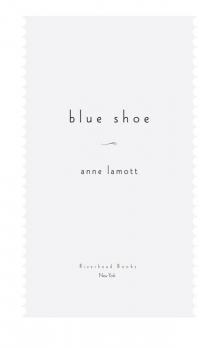 Blue Shoe
Blue Shoe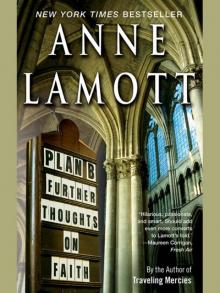 Plan B
Plan B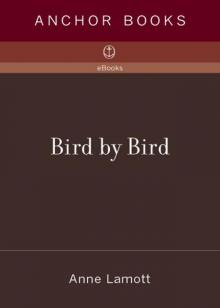 Bird by Bird
Bird by Bird